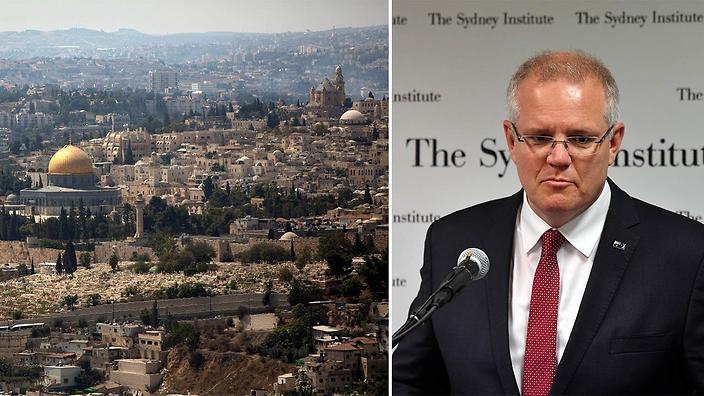Breaking
- MENU

On 15 December 2018, Australia reversed its decades-old Middle East policy by recognizing West Jerusalem as the capital of Israel. Australian Prime Minister Scott Morison confirmed that his government has recognized “West Jerusalem as being the seat of the Knesset and many of the institutions of government is the capital of Israel,” but he assured that the embassy wouldn’t be shifted from Tel Aviv unless there is a peaceful settlement to the Arab-Israeli conflict. With this, Australia joins the growing list of countries that have in recent years recognized West Jerusalem as the capital of Israel despite the stalemate in the Middle East Peace Process.
At the end of the 1948-49 Arab-Israeli war, Jerusalem was divided into two sectors: Western part of the city was held by Israel while the Eastern part was under Jordanian rule. The western portion was majorly occupied by Jews and few Arab families; most of the latter had fled to eastern part of the city. The Jordan-held East Jerusalem was occupied by majority Muslims and Christians. Following the 1967 war, East Jerusalem was annexed by Israel and merged with the western part of the city. United Nations Security Council Resolution 242 in November 1967 called for Israel to “…withdraw from all territories occupied in the recent conflict…” The Resolution was partially followed by Israel due to a dispute in the wording of the resolution. Israel pulled out of the Sinai in 1982 and the Gaza Strip in 2005 but remains in the other occupied territories till date.
In 1980, the Knesset passed the Jerusalem Law which declared, “Jerusalem, complete and united, is the capital of Israel.” This declaration was considered “null and void” by United Nations Security Council Resolution 478. Due to the controversial status of Jerusalem, most countries have till date steered clear of recognizing any part of Jerusalem as the capital of Israel even though the Knesset, Israeli Parliament and the Supreme Court of Israel is situated in West Jerusalem. As per the international consensus, there was an understanding among countries to balance their relations with Israel and Palestine by visiting both parts of the city when they visited Israel.
On 6 December 2017, Donald Trump, the President of the United States of America, declared that the US is in process of recognizing Jerusalem as the capital of Israel and the US embassy would soon be shifted from Tel Aviv to Jerusalem. Within few days, Turkey and Yemen proposed a motion in the United Nations calling upon, “…all States to refrain from the establishment of diplomatic missions in the Holy City of Jerusalem…,” in accordance with previous resolutions of the United Nations. Despite threats by the US, 128 countries voted for the motion while 9 countries including the US voted against, 35 countries abstained, and 21 countries were absent during the voting. Despite the overwhelming support to the Resolution, the US opened its embassy in Jerusalem in 2018 followed by Guatemala. Australia interestingly, was one of the countries which abstained during the voting of the motion.
Following the abstention in the UN, there has been a gradual change in Australian diplomacy. This can be traced back to October 2018 when Morison in the week leading to the by-election in Wentworth said, “… found arguments in favour of moving Australia’s diplomatic presence from Tel Aviv to be persuasive.” Interestingly, Wentworth has approximately 12.5 percent Jewish population who had a strong influence in the elections. The candidates were: Dave Sharma, a Liberal Candidate from the same party as Morison and was a former ambassador to Israel and Kerryn Phelps who ultimately won the election. Even though the diplomatic move might have been formulated due to domestic compulsions, it soon became a policy which affected Australia’s relations with other nations.
As part of the announcement, Australia has further stated that it won’t be shifting its embassy from Tel Aviv like the United States of America, it will instead open a defence and trade office in West Jerusalem. This move will attempt to allay the anger of the Palestinians who have deemed Australia’s recognition of West Jerusalem as the capital of Israel as a sign of betrayal and have threatened to boycott Australian-made goods. Australia, on the other hand, views this momentous decision as a step towards playing a bigger role in the Middle East Peace Process which for ages has been dominated by the United States of America.
Following the decision, several countries like Malaysia came out strongly and condemned Australia ’s move. It called the decision “premature” and a “humiliation to the Palestinians”. There were several demonstrations that were held in recent weeks around the Australian Embassy in Jakarta and the Australian Consulate-General in Surabaya. The Indonesian Government has also delayed finalizing its free trade deal with Australia. The deal had taken eight years to negotiate and was approximately worth US$16 billion a year. Indonesia’s Trade Minister Enggartiasto Lukita said, “Australia’s position [on the embassy] was the reason for delaying the signing of the Indonesia Australia Comprehensive Economic Partnership Agreement.” The deal is now on shaky ground and with national elections in both the countries in 2019; its future is really unpredictable.
Apart from the backlash, the policy move will, in all likelihood not make a substantial impact on the Peace Process. Firstly, Australia has never been an active member of the Middle East Peace Process. Long distance and lack of being at stake have made Australia toe the international consensus of following America’s leadership in the process. This move, although appreciated by Israel will not appease either of the parties: Israel or Palestine. On one hand, Israel will be disappointed with Australia as it did not recognize undivided Jerusalem as its capital. Recently Israel passed the Jewish State Law in which it stated that “the unified and complete city of Jerusalem is the Capital of Israel.” Hence, recognizing West Jerusalem as the capital may not please many Israelis. On the other hand, Palestinians will see the step as a refusal to accept the Palestinian state.
Secondly, the move will not shake the stalemate in the peace process. According to international consensus, a two-state solution is the only viable way to solve the Arab-Israeli conflict with the status of Jerusalem in question: whether to be under international governance or divided between the two states. Recognition of West Jerusalem as the capital of Israel insinuates Australia’s stand on East Jerusalem which traditionally has been demanded by the Arab leaders to be the capital of the future Palestinian state. Thus, the move doesn’t go against the Peace Process and won’t affect the trajectory of the same.
Nonetheless, the announcement which was a complete U-turn of Australian policy towards the Arab-Israeli conflict has brought into light the growing trend among countries to recognize Jerusalem or part of it as the capital of Israel rather than Tel Aviv. It is the third country to do so after America and Guatemala but its recognition of only the Western side of the city is unique. Whether this trend will expedite the Middle East Peace Process or not is yet to be seen.
Note: This article was originally published in the web-magazine, The Geopolitics on 2 January 2019 and has been reproduced with the permission of the author. Web link

Dr. Dipanwita Chakravortty is an Assistant Professor (Political Science) in a Private University, Delhi/NCR. She was previously associated with the Centre for Air Power Studies as a Research Associate. She obtained her Doctorate from Jawaharlal Nehru University for her thesis on Women Soldiers in Israel Defence Forces, and she was a recipient of the Israel Government Scholarship during 2015-16. She has been associated with MEI since June 2011 and prepared China Watch (April 2012-July 2015), Election Watch (February 2013-May 2017) and Pakistan Watch (June 2011-December 2011) for MEI. Dr. Chakravortty has written articles and book chapters on the Middle East, including the crisis in Yemen, women in Kurdish National Movement and so on. Presently, she is researching the role and impact of Women soldiers in various national armies in the Middle East.

The grant of citizenship by Canada to a Saudi woman Rahaf al-Qanun marks another milestone in the on.....
